AY-3-8500
The AY-3-8500 "Ball & Paddle" integrated circuit was the first in a series of ICs from General Instrument designed for the consumer video game market. These chips were designed to output video to an RF modulator, which would then display the game on a domestic television set. The AY-3-8500 contained six selectable games — tennis (a.k.a. Pong), soccer, squash, practice, and two rifle shooting games. The AY-3-8500 was the 625-line PAL version and the AY-3-8500-1 was the 525-line NTSC version. It was introduced in 1976, Coleco becoming the first customer having been introduced to the IC development by Ralph H. Baer.[1] A minimum number of external components were needed to build a complete system.
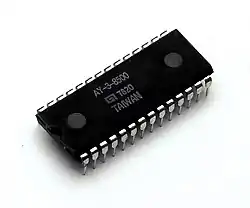
The AY-3-8500 was the first version. It played seven Pong variations. The video was in black-and-white, although it was possible to colorize the game by using an additional chip, such as the AY-3-8515.
Games
Six selectable games for one or two players were included:
| Game | Number of players |
|---|---|
| Tennis | 2 |
| Soccer | 2 |
| Squash | 2 |
| Practice | 1 |
| Rifle game 1 | 1 |
| Rifle game 2 | 2 |
In addition, a seventh undocumented game could be played when none of the previous six was selected: Handicap, a soccer variant where the player on the right has a third paddle. This game was implemented on very few systems.
Usage
The AY-3-8500 was designed to be powered by six 1.5 V cells (9 V). Its specified operation is at 6-7 V and a maximum of 12 V instead of the 5 V standard for logic. The nominal clock was 2.0 MHz, yielding a 500 ns pixel width. One way to generate such a clock is to divide a 14.31818 MHz 4×colorburst clock by 7, producing 2.04545 MHz. It featured independent video outputs for left player, right player, ball, and playground+counter, that were summed using resistors, allowing designers to use a different luminance for each one. It was housed in a standard 28-pin DIP.
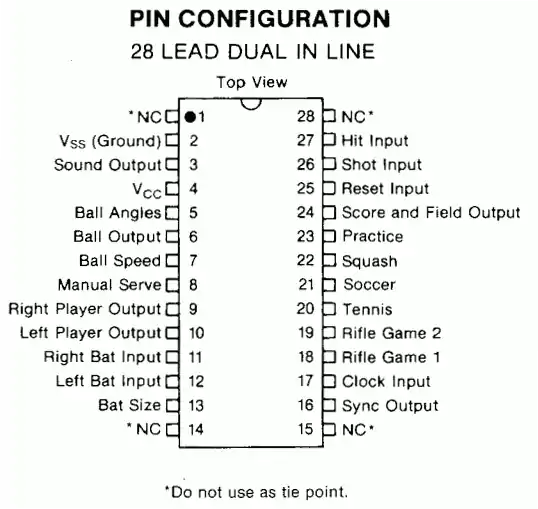
Applications
Some of the dedicated consoles employing the AY-3-8500 (there are at least two hundred different consoles using this chip[2]):
- Sears Hockey Pong
- Coleco Telstar series (Coleco Telstar, Coleco Telstar Classic, Coleco Telstar Deluxe, Coleco Telstar Ranger, Coleco Telstar Alpha, Coleco Telstar Colormatic, Coleco Telstar Regent, Coleco Telstar Sportsman)
- Odyssey series (Magnavox Odyssey 300, Magnavox Odyssey 2000 and Magnavox Odyssey 3000)
- RadioShack TV Scoreboard
- Unisonic Sportsman/Tournament
- Philips Tele-Game ES 2203 Las Vegas and Philips Tele-Game ES 2204 Las Vegas
- Play-O-Tronic
- Videomaster (Strika, Strika 2,ColourScore 2, SuperScore)
- APF TV Fun (Model 401)
- Sportsmaster TVG 901
- Prinztronic Micro Ten Deluxe Colour TV Game (United Kingdom)
- Ameprod Television Game 10 (one of a few consoles made in Poland)[3]
AY-3-8550
The AY-3-8550 was the next chip released by General Instruments. It featured horizontal player motion, and a composite video output. It was pin compatible with the AY-3-8500. It needed an additional AY-3-8515 chip to output video in color.
Games
Six selectable games for one or two players were included:
| Game | Number of players |
|---|---|
| Tennis | 2 |
| Soccer | 2 |
| Squash | 2 |
| Practice | 1 |
| Rifle game 1 | 1 |
| Rifle game 2 | 2 |
Usage
The AY-3-8550 used the No Connect pins from the AY-3-8500, so it was possible to put an AY-3-8550 on an AY-3-8500 (without horizontal movement), and vice versa.
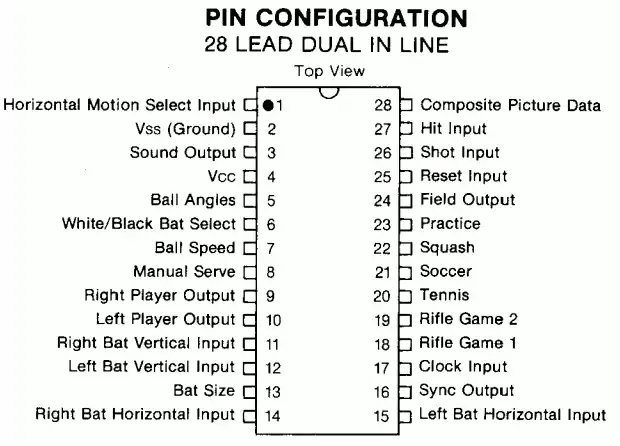
AY-3-8610
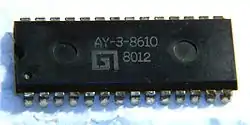
The AY-3-8610 was a major update from General Instruments. It played more games (10),[4] like basketball or hockey, with higher-quality graphics. It was nicknamed "Superstar" by GI. It was in black and white, although it was possible to add color by using an additional AY-3-8615 chip.
Prior to producing the 8610, GI created the AY-3-8600. The pin configuration was the same as the 8610, but it was missing the two rifle/target games, bringing the total number of games down to 8.
Games



The 10 selectable games for this chip included:
| Game | Number of players |
|---|---|
| Tennis | 2 |
| Hockey | 2 |
| Soccer | 2 |
| Squash | 2 |
| Practice | 1 |
| Gridball | 1 |
| Basketball | 2 |
| Basketball practice | 1 |
| Two player target | 2 |
| Single player target | 1 |
Usage
The AY-3-8610 featured a completely different pinout. It, too, required an external crystal oscillator. It still had separate video output pins, and removed the dedicated sync pin.
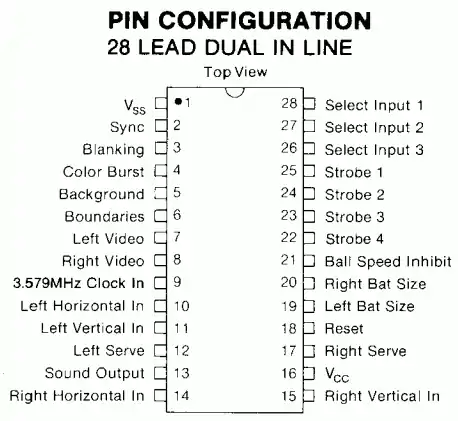
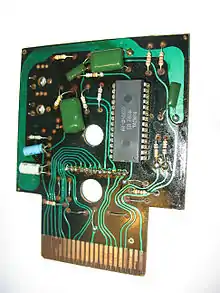
Application
This is a list of consoles that use the AY-3-8610:[2]
- Binatone TV-Master MK 8 e 10
- Grandstand Sports Centre 6000
- Match Color
- Telejogo II
- Universum Color Multi-Spiel 4010 e 4014
- Videomaster Sportsworld
- Hanimex TVG-8610
- Interstate 1110
- ITT/Ideal Tele-Match Cassette 2
- Polycon C 4016
- Serie PC-50x
- Radofin Colour TV Game
- Radofin Tele-Sports III
- Saft-Leclanché TV 8 Sports
- TV 18 - 18 Spannende Videospiele C-4016
- TV 2018 Color - 18 Spannende Videospiele 441/2
Some consoles that use the AY-3-8600 chip:[2]
- Coleco Telstar Galaxy
- Creatronic Bi.Bip 8
- Enterprex Color Home Video Game Apollo 2004
- Magnavox Odyssey 4000
- Philips Tele-Game ES 2218 Las Vegas
- Ricochet Electronic Ricochet 8
- Roberts Sportrama 8
- Unisonic Olympian 2600
Derivatives
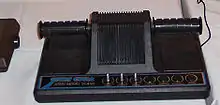
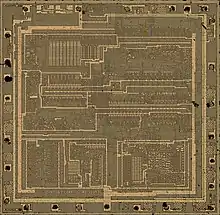
| chip | Year | Derived from | DIP | Console | Note |
|---|---|---|---|---|---|
| AY-3-8510 | 1978 | AY-3-8500 | 16 pin | Coleco Telstar Colortron | Four of six games of 8500 (no rifle/target games), with full colors |
| AY-3-8512 | 197? | AY-3-8500 | 16 pin | Coleco Telstar Marksman | The same of 8500 but with colors |
| AY-3-8700 AY-3-8710 | 1978 | 28 pin[4] | Coleco Telstar Combat! PC-50x | Four combat games with tanks, 2 players | |
| AY-3-8603 | 1978 | PC-50x | Car race with vertical view. The car accelerate and the player must avoid collisions. 1 or 2 players | ||
| AY-3-8605 | 1978 | PC-50x | Three games: a ship must fire torpedoes to hit submarines | ||
| AY-3-8606 | 1978 | PC-50x | 10 breakout games. 1 or 2 players | ||
| AY-3-8760 (8765 PAL) | 1978 | Atari Stunt Cycle Sears Motocross PC-50x | Motor-Cycle. Three game levels. A motorbike must jump over different objects (bus, etc.) | ||
| AY-3-8607 | 1978 | PC-50x | 4 games with an optical rifle. More than one difficult level | ||
| AY-3-8750 | 1978 | Superspace. Space battle for two players |
- An equivalent to the AY-3-8500 is the TMS1965NLA manufactured by Texas Instruments.
- The Soviet K145IK17 (Russian: К145ИК17) has a built-in counter, making it possible to use a momentary pushbutton instead of a multi-position switch to select games. The handicap game is not hidden, it can be chosen among others using this button. Since a pushbutton occupies only one pin, this IC has less pins.
- A competitor was the National Semiconductor MM57105.
References
- http://www.pong-story.com/coleco.htm The Coleco Telstar story
- http://www.pong-story.com/mypongs.htm List of first era consoles
- http://www.elektroda.pl/rtvforum/topic1347024.html
- "Archived copy" (PDF). Archived from the original (PDF) on 2012-03-16. Retrieved 2012-11-17.CS1 maint: archived copy as title (link) Gimini - TV Game Circuits
